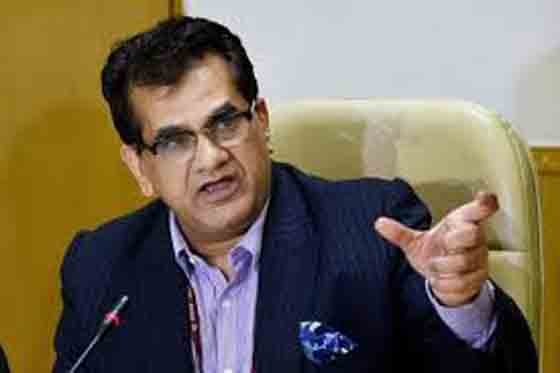INVC NEWS
The forward-looking roadmaps for SATH-E were released at the conclusion of the first meeting of the National Steering Group (NSG), the governing body for the project, which is chaired by the CEO of NITI Aayog.
“SATH-E aspires to be a ‘saathi’, to the educational system with the student and the teacher at its centre”, said Shri Amitabh Kant, underscoring the significance of this project. “The aim is to make the entire governmental school education system responsive, aspirational and transformational for every child.”
The release of the States’ roadmap was preceded by a workshop anchored by the States’ Principal Secretaries for education and State Project Directors along with field level functionaries. The States presented their respective systemic and innovative best practices so as to learn from each other.
Shri Deepti Gaur Mukharjee, Principal Secretary, Madhya Pradesh, gave an overview of the teacher rationalization scheme being initiated in the state to ensure that vacancies are filled through transfer of surplus teachers across schools through a transparent, online system. Shri PK Mahapatra, Principal Secretary, Odisha, highlighted the development of iLMS (Integrated Litigation Management System) which is an integrated, online software for efficiently managing education-related cases pending in various courts and tribunals. Shri Amrendra Pratap Singh, Principal Secretary, Jharkhand, discussed the need of optimisation of school size for improvement in quality, meet teacher requirements & efficient allocation of resources.
These programmes and other initiatives stated in the Roadmap will be further strengthened, customized and executed by the SATH-E States in consultation with knowledge partners – the Boston Consulting Group and Piramal Foundation for Education Leadership – over the next 24 months.
This ‘tripartite arrangement’, where the NITI Aayog, the three States, chosen througha challenge method, and knowledge partners from the private sector, symbolises the very essence of competitive and cooperative federalism exemplified by NITI. The process ensured that schemes of the Ministry of Human Resource Development (MHRD) and projects under SATH-E are in sync with their respective state schemes.
About SATH-E
In May 2017, the NITI Aayog wrote to all States offering assistance for improving their health and education sectors. 16 States responded favorably. Following presentations and consultations with MHRD, the three States of Jharkhand, Madhya Pradesh and Odisha were selected for the programme. The Sustainable Action for Transforming Human Capital-Education (SATH-E) was thus, born.
The SATH-E initiative in based on formal agreements with the States and will be funded through a cost-sharing mechanism between NITI Aayog and the participating states. The Boston Consulting Group (BCG) and Piramal Foundation for Education Leadership (PFEL) were chosen as knowledge partners for the project facilitating review, data collection and implementation.
SATH-E has been envisaged as a programme which aims to transform elementary and secondary school education across these three states. SATH-E roadmap refers to a time-bound, goal-driven exercise that will reach its logical culmination by the end of the academic year 2020. Further, the foundations of other long term interventions,as is found necessary by each state, would be laid during this period.
Limiting interventions to only those where there is complete state buy-in for sustainability, the whole process would be done in consultation with the states and MHRD. This will be facilitated by the National Steering Group (NSG), chaired by the CEO of NITI Aayog and including the Chief Secretaries of the States, which will continuously monitor progress, introduce course-corrections and offer a platform for addressing issues in implementation.
Thus, SATH-E aims to create role model States for education and mainstream ‘islands of excellence’ across the country to facilitate qualitative and quantitative transformation of learning outcomes. Marrying technology with need-based, data-driven assessment and a ‘giving it what it takes’ approach – be it innovation, incubation, external third party funding and Public- Private- Philanthropic Partnership (PPPP) experimentation – SATH-E puts the States in the driver’s seat to transform education at scale.


















